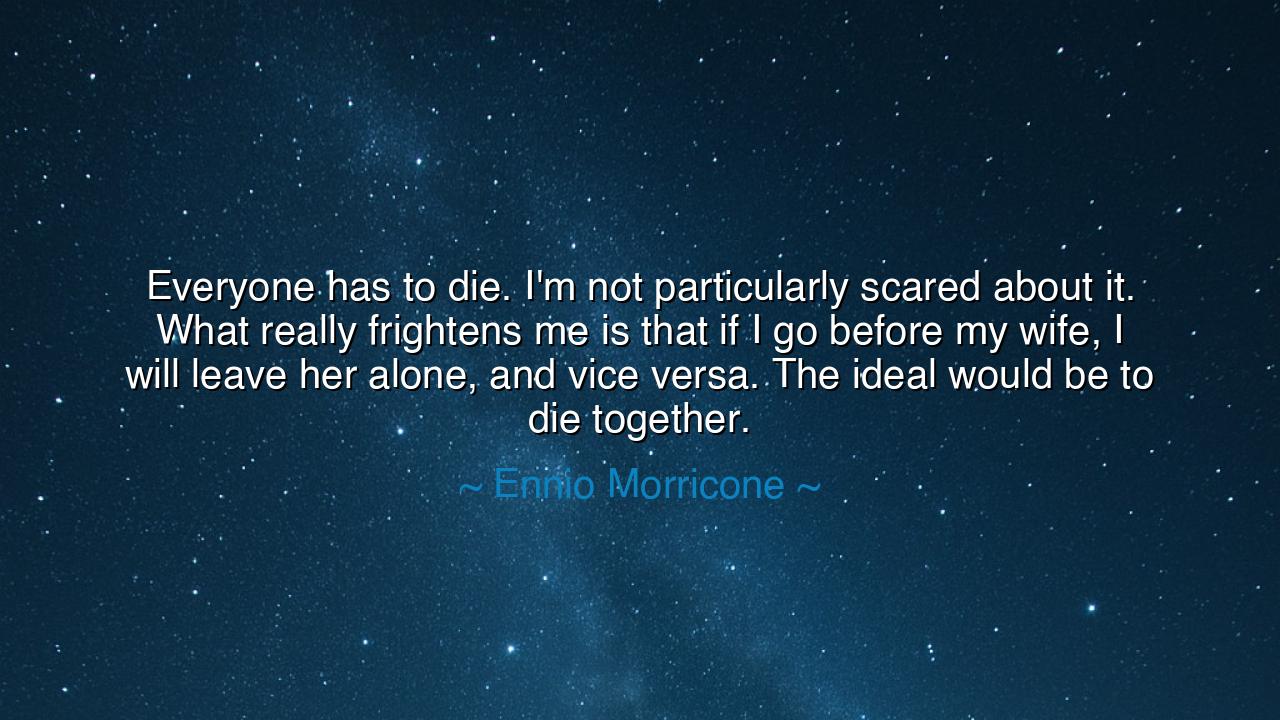
Everyone has to die. I'm not particularly scared about it. What
Everyone has to die. I'm not particularly scared about it. What really frightens me is that if I go before my wife, I will leave her alone, and vice versa. The ideal would be to die together.






In the tender and contemplative words of Ennio Morricone, he said: “Everyone has to die. I'm not particularly scared about it. What really frightens me is that if I go before my wife, I will leave her alone, and vice versa. The ideal would be to die together.” These words, uttered by one of the greatest composers of the modern age, reveal a truth both intimate and eternal. They are not merely about death, but about love — a love so deep that it transcends even the fear of mortality. Morricone, whose music gave voice to emotions that words could not contain, here speaks with the humility of one who knows that the greatest symphony of life is not written in notes, but in the bond between two souls.
When Morricone says that he is not afraid of death, he speaks as one reconciled to the nature of existence. Like the wise of old, he accepts that all who live must die; that death, far from being a tragedy, is the final movement of life’s composition. But what he fears is not his own end — it is separation. The thought of leaving his beloved alone, or of living on without her, wounds him more deeply than death itself. In this, he gives voice to the most human of fears: not the fear of ceasing to exist, but the fear of outliving love.
The origin of these words lies in Morricone’s lifelong devotion to his wife, Maria Travia, his companion of over seventy years. She was not merely his partner but his muse; she wrote the lyrics to many of his most haunting compositions. To those who knew him, their love was a quiet legend — steadfast, private, unwavering. Morricone lived not as a celebrity but as a husband and artist, bound by faith, discipline, and affection. His wish “to die together” was not born of despair, but of completeness: for he felt that his life, like his music, was whole only when she was within it.
There are echoes of such devotion throughout history. The philosopher Marcus Aurelius, in his Meditations, spoke of accepting death calmly — yet even he grieved deeply at the thought of losing those dearest to him. And in the myth of Orpheus and Eurydice, love dares to challenge death itself: Orpheus descends into the underworld to reclaim his lost beloved, proving that the soul’s deepest longing is not for immortality, but for reunion. Morricone’s words carry the same spirit — not rebellion against death, but reverence for love’s endurance within it.
In truth, Morricone’s reflection is also an act of gratitude. To fear separation is to have loved well. The man who dreads leaving his wife alone has already lived richly, for his fear springs from the beauty of what he has known. In this way, his words remind us that love transforms mortality. Death may claim the body, but the bond of shared life — of laughter, faith, and creation — remains indestructible. The ideal of “dying together” is not merely a wish for simultaneous death; it is a longing that one’s final breath be taken not in solitude, but in the embrace of meaning.
Let this, then, be the lesson: love is the only immortality worth seeking. We spend our days chasing greatness, wealth, and glory, yet at the end, what we fear losing is not power, but presence — the quiet companionship of one who knows our soul. Cherish, therefore, the ones who walk beside you. Speak the words of affection while they can still be heard. Build your days not around ambition, but around the music of shared existence.
And so, the wisdom of Ennio Morricone becomes a hymn for all who love truly. Death will come, as it must, but love endures beyond its reach. Whether we go first or last, whether together or apart, the essence of love — like his timeless melodies — will continue to resonate. For in every heart that has known deep affection, there lies the eternal refrain: to live is to love, and to love is to conquer death itself.






AAdministratorAdministrator
Welcome, honored guests. Please leave a comment, we will respond soon